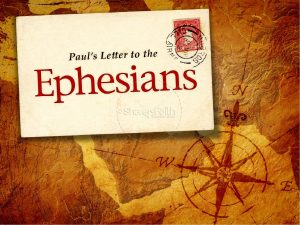
Ephesians 1:15-23
The letter to the Ephesian church speaks a lot about our identity, but the more important question is, do we know God?
The apostle Paul desired the Ephesian Christians to understand what great wealth they had in Christ.
Notice that Paul is not praying for them to receive something from God that they do not have, rather he is praying that God will reveal to them what they already have.
Paul writes in verse 15-16, “For this reason, because I have heard of your faith in the Lord Jesus and your love toward all the saints, I do not cease to give thanks for you, remembering you in my prayers.”
Paul heard that they were people of faith and love. The Christian life has two dimensions: faith toward God, and love toward men, and you cannot separate the two (see John 13:35).
Paul writes that he is praying continuously for the believers in Ephesus (see 1 Thessalonians 5:17).
As followers of Jesus we are to be a people of prayer, speaking to God, hearing from Him and practicing a lifestyle of prayer.
In verses 17-19, Paul turns to petition. As he writes out his prayer, he uses three phrases that refer to illumination or understanding. In verse 17: Spirit of Wisdom and of revelation and verse 18: having the eyes of your heart enlightened.
Paul prayed that they would have spiritual eyes to see who God is and what He has done for them.
This is essential when we approach the Bible as we need the Holy Spirit to reveal truth to us (see Luke 24:45).
Charles Spurgeon said, “apart from the Spirit, it is easier to teach a tiger vegetarianism than an unregenerate person the Gospel.”
We will never fully grasp the Word of God if we approach it like a textbook. Sadly, so much of our passion for discipleship is not pointing people to a relationship fed by the word of life, rather, we are trying to teach people a book.
This is also why there is so much false teaching and confusion in Christian circles today. People are not feeding on God’s word for themselves. As a result, there is a self-imposed starvation in the body of Christ.
In Psalm 119, David frequently asks God for revelation and understanding (see Psalm 119:18, 34, 135).
One of the reasons we don’t pray for God to speak to us through the Bible is because we have an over-inflated opinion of our own abilities. We come with our educated opinions and intellect and think that we have it all figured out.
The first step of hearing from God in His word is to approach the Bible with humility.
Along with our lack of humility, we also have a low view of God. Paul had a healthy view of God, in verse 17 he describes God as “the Father of Glory”.
Paul often related the glory of God with the power of God. Paul was confident that God has the power to open the eyes of our hearts and give us understanding.
Verse 17 ends with the words, “the Spirit of wisdom and of revelation in the knowledge of Him”.
As followers of Jesus, through the presence of the Holy Spirit, we can grow in our knowledge of Him. The Christian walk is daily discovering more about God for the rest of eternity (see John 17:3). The beginning, the middle and the end of the Christian life is about knowing God.
The Christian life is about knowing God and making him known, this is the normal Christian life.
J.I. Packer in his book “knowing God”, says that those who know God have 4 characteristics:
- Great energy for God
- Great thoughts of God
- Great boldness for God
- Great contentment in God
Verse 18 continues, “having the eyes of your hearts enlightened, that you may know what is the hope to which he has called you, what are the riches of his glorious inheritance in the saints”.
What is the hope to which He has called us?
Paul wants the readers to know that they were called by God and as a result there is a hope of eternal life. The Greek word for “hope” means to look forward with the expectation of a certain outcome. As followers of Jesus, we don’t have a distant hope in an uncertain future, we have a certain glorious anticipation in Jesus coming again and the kingdom of Heaven being established for eternity. We have a living hope (see 1 Peter 1:3).
Paul then writes again about an inheritance in verse 18, “…what are the riches of his glorious inheritance in the saints.” We are God’s inheritance! God looks on the redeemed as a part of His great wealth. God gets the glory from the church and when Jesus comes again, we will be to the praise of His glorious grace as we saw in verse 6.
God the father sees us today as who we are in Christ. God always looks at a person’s destiny rather than their present situation.
Back in Judges 6, the angel of the Lord met with Gideon who was cowering from the Midianites and said to him, “The Lord is with you, O mighty man of valor.” Judges 6:12b
Gideon didn’t know who he was, but God knew who he was called to be. As followers of Jesus, God sees us as who we are in Christ. We are called out and covered by the righteousness and Glory of the risen Lord Jesus. Our lives are controlled by what we shall be when Christ returns. We are Gods inheritance, and we live to bring Him glory.
We are designed and created to know God and to make Him known, to bring Him glory.
Do you know that today?
Do you hunger to know God more?









